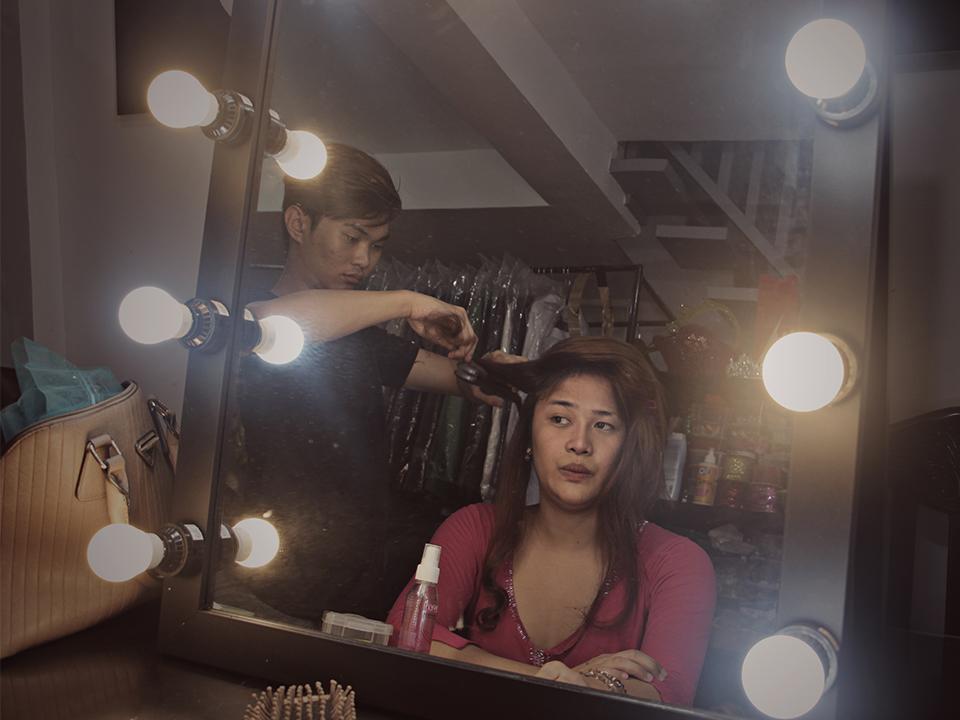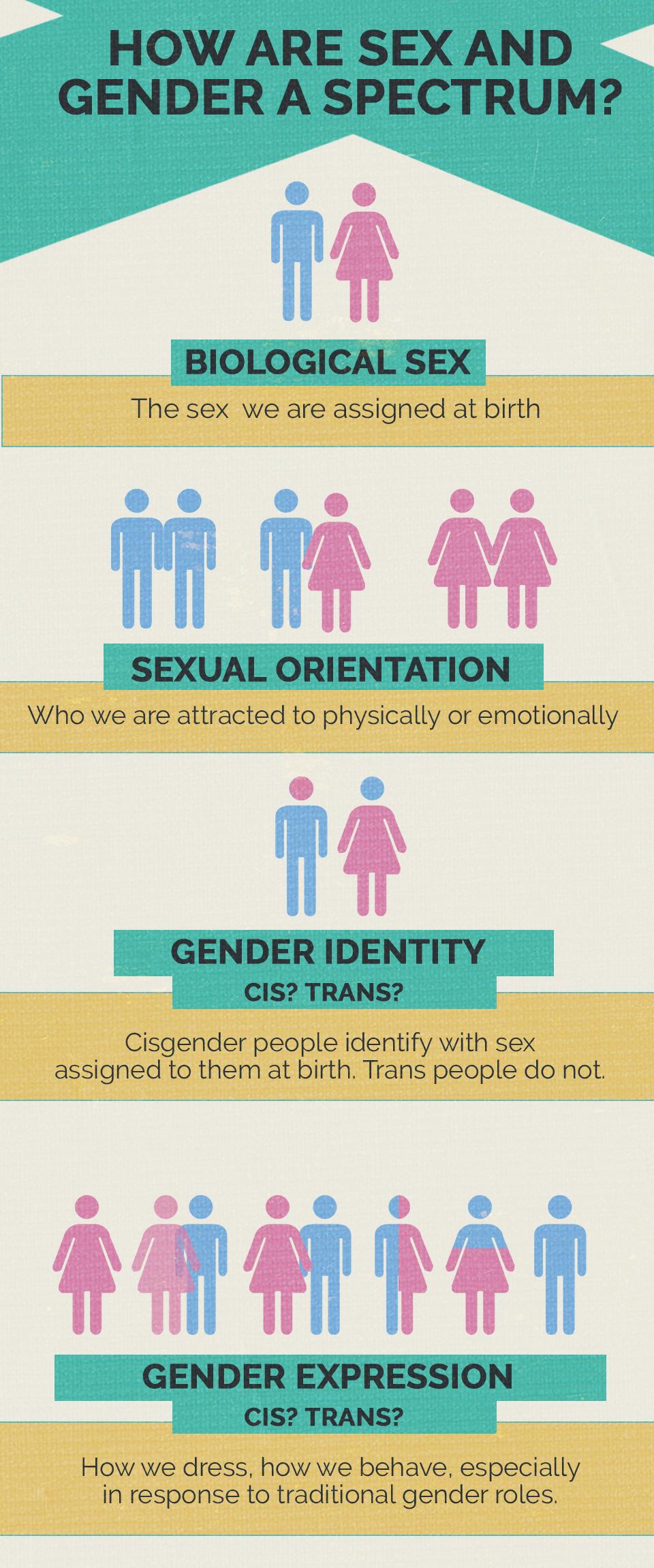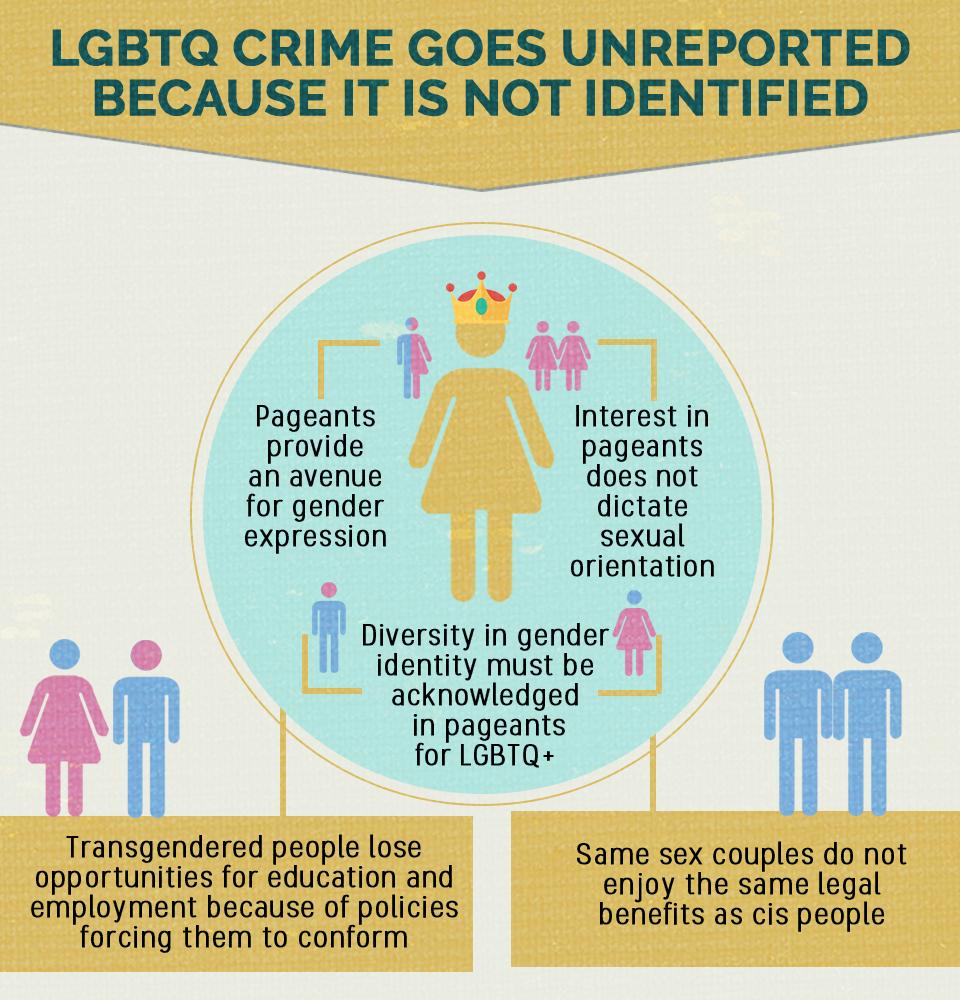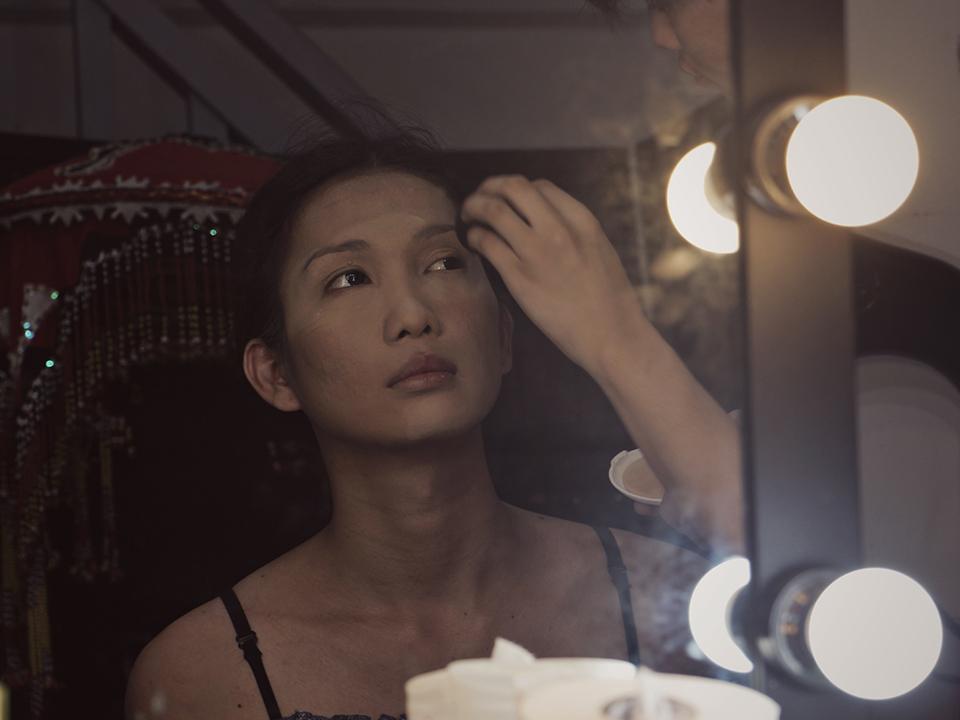Binibini rin kami: Trans visibility under the glitter of pageantry
The joke goes that if the LGBT community stops supporting pageants, the entire industry will die. Behind the women who impress with their perfect cheekbones and confident walk are the eager fans from the rainbow family—fixing their hair, applying their make up, improving their posture, and coaching them for the all important Q&A.
In less glamorous corners of the country, these pageant enthusiasts fulfill their own dreams of becoming beauty queens and, for some, becoming women themselves.
The nerves start sooner for them, because scrutiny begins long before they walk onstage. Their excitement is laced with anxiety born from a lifetime receiving taunts, jeers, and worse.
For them, the dressing room is a makeshift den of tarpaulin and pipes. Gerard Quiogue has seen hundreds of these—some worse, some better—in her 11-year career as a "pageantera."
She shares the space with friends, competing for the same title: Miss Gay Universe 2017. Quiogue, however, is not gay, and neither are fellow queens Yesha or Victoria.

We are women
Quiogue and Yesha identify as women, while Victoria is bisexual. Both trans women believe that using the term "gay pageant" as a catch-all term for competitions for homosexual men, drag queens, bisexuals, and transgender women obscures the nuances of human sexuality.
"I am trans identifying. I don't see myself as a gay guy. I do not identify with the sex assigned to me at birth," Yesha said. "Ako 'yong personal advocacy ko is I really don't want these 'Miss Gay' pageants to be called 'Miss Gay' in the first place, kasi ang dami kong nakikitang trans individuals who take part as competitors of these pageants, right?"
Sex, sexual orientation, gender identity, and gender expression is rarely if at all discussed in the Philippines, which has led to the confusion that there are only four identities: girl, boy, bakla, tomboy.
“Bakla” or gay (a male attracted to males) is under sexual orientation, while “tomboy” (a female who expresses herself in a more masculine way) falls under gender expression. Gay men are not necessarily effeminate, because sexual orientation and gender expression are not the same. Women who do not enjoy “girly” things are not necessarily lesbians.
In the same vein, sex does not dictate gender identity. One can be born woman, but identify as a man.

"[I]n the sense of political correctness, I don't think it's politically correct that you're trans and then you join 'Miss Gay' pageants ... nashashadow 'yong visibility ng trans women in joining those pageants," said Yesha. "So maganda sana kung 'Mutya ng Something' or 'Queen of Something.' Mas neutral 'yon, for both homosexual guys who dress up as women for pageants and for trans women who join those pageants."
She clarified that she's not against labels per se, adding, "I also understand where they are coming from, because I think this all roots from the problem that trans people don't really have the same opportunities as cis people in terms of being able to secure jobs that would regularly pay them and so they usually resort to other things."
"Some resort to prostitution, others make a living out of joining pageants. Some really just join for the love of it—mga enthusiasts sila," she continued, dispelling overly dramatic stereotypes without dismissing the discrimination that members of the LGBT community face.
Yesha has been joining pageants for just three months, but she has been an advocate for LGBT rights for much longer. She says that the stage, despite the problematic parts of it, is another avenue for her to educate people.
Sabina Zaira Torregoza of advocacy group GAYON Albay Lesbian, Gay, Bisexual and Transgender Org. Inc. concurred to some extent with Yesha, but stressed that advocacy must go beyond one evening of glamour.
If Miss Gay Bicolandia—a title Quiogue herself has won—is to be used as a platform for LGBTQ+ rights, she agreed that "gay" should be dropped from the pageant's title and demanded that the trans winners truly use their voice to promote trans rights.
Arming each other with knowledge
Torregoza has previously joined pageants and has seen what it can do for trans women, but she like Yesha grapples with the problems within the system. The hosts, for example, sometimes resort to insult comedy at the expense of the candidates to draw laughs from the audience.
The stage gives the candidates a chance to educate people, but not if they're too busy laughing. "Minsan dahil sa host, nababastos ang mga candidates ... As much as possible, ayaw kong may napapahiya," said Torregoza.
Taking a more active part in the community, Torregoza now organizes and hosts pageants when she can. Backstage, she helps prepare the beauty queens for the Question and Answer portion, to make sure that they make the best out of their time onstage.
But there's another side to the pageant that Torregoza is exposed to only through her work with GAYON. In far-flung small towns where gowns and makeup are inaccessible to trans women, body image issues begin to develop.
"Makikita mo ang mga trans women d'on, may mga bigote, may muscles. Pero they identify as women," she explained.
The beauty queens, almost unsurprisingly, set unrealistic standards for trans women. Torregoza said that the doll-like image of pageanteras push some to transition on their own through risky means. "Sila 'yong nag-iinject sa sarili nila para magka-boobs," she said.
Worse, they make the transition without proper counseling—something she also wishes to be included in pageants.
"Sana mayroon ding series of activities like seminars on HIV/AIDS and SOGIE [sexual orientation, gender identity, and gender expression] for the candidates and the hosts," Torregoza said.
A SOGIE workshop for members of the LGBT community might seem redundant, but these lectures could help improve the accuracy of hate crime statistics. "'Yong iba hindi nila alam na nadidiscriminate sila," said Torregoza. "Kapag tinanong mo sila, sasabihin nila hindi naman. Pero kapag binigiyan mo sila ng A-B-C option, ayan na, sasabihin nila ''Yan, na-experience ko 'yan.' Kinikulong sila sa banyo, pinapahawak ang kung anu-ano, gano'n."
"Sinasabi namin sa kanila, anything na ayaw mong gawin na pinapagawa sa iyo, puwede mo ireklamo. Sapilitang pagpapahawak o pagpapasubo, kasama 'yan," Torregoza said. "Feeling kasi nila, dahil trans sila, natural 'yon na nangyayari."
In some cases, the sexual assault happens in the hands of an uncle or a cousin who wants to correct or punish "aberrant" behavior.

Trans rights are human rights
There's a world outside pageants that Torregoza faces with other trans women. Speaking frankly, she quipped, "Every day is a beauty pageant. Pagkagising mo production number na agad. Paglabas mo ng bahay, dapat prepared ka sa Q&A."
Trans identity is constantly questioned and though we associate them with sass in the face of adversity, trans women have to live with reality. "Ang trans woman, kapag inutusan mong bumili ng P2 na betsin sa tabi, dalawang kilometro ang lalakarin. Hahanap ng madadaan na hindi siya magkukutya o masasaktan," said Torregoza.
The worst of all hate crimes, violent murder, attracts national attention. Beyond this, trans women suffer verbal abuse at home, bullying at school, and exclusion in society—most of which are simply swept under the rug.
"'Yung iba are forced to drop out of school dahil hindi nila na-e-express ang sarili nila, gaya ng pagpapahaba ng buhok at pagsusuot ng damit na mas komportable para sa kanila," Torregoza revealed.
Teachers demand boys who identify as girls to get haircuts, which may have a negative impact on the child's motivation to keep participating in classes or attending school. "Tinatanong ko nga sa kanila: 'Nakakaapekto ba ang pagpapahaba ng buhok sa pag-aaral?' Kasi kung oo, dapat lahat pati mga babae naka-4x4 na haircut na rin, 'di ba?"
Even if they conform, trans women receive little protection against taunts and physical assaults from classmates. They also refrain from speaking up. There's paracetamol for punches, but there's nothing you can take to soothe the pain when your family blames you for being bullied.

Before joining pageants, Yesha was in law school. She wasn't asked to leave, but the pressure was there. She and Quiogue share the same story of reaching for the pause button in their chosen careers after being made to feel unwelcome.
"Hindi ko napagpatuloy 'yong teaching career ko. It's simply because the code of ethics here in the Philippines dictates that no transgender should be allowed to teach in school," Quiogue said. "How will the students respect you if you dress like a woman and ... ganito ka, bakla ka. Kasi ang tumatak na d'on sa isip nila is that, if you're gay, you should be discriminated [against], 'di ba?"
This hate may be internalized, leaving trans women vulnerable to exploitative sex work. Shunned by their family and unemployed—because of their lack of education or simply rejected by employers because of their sexual identity—young trans women in Torregoza's hometown hang around in cheap lodging houses, performing sexual favors for P150 to P200, or P300 if they're really lucky.
Some trans women with college degrees still end up doing "pilgrimages" to the red light district in Manila. Torregoza shares the story of a friend who was forced to resign from her job at a bank because her employers were demanding that she cut her hair and conform to the sex she was assigned at birth.
She could have been an accountant. Instead, she became a sex worker. It seems ridiculous that options are made unavailable to trans women simply because they want to wear their hair long.
Discrimination and victim-blaming
These are the problems the Anti-Discrimination Bill seeks to resolve, but it has met strong opposition from staunch Catholics in the Senate, like boxer-turned-politician Manny Pacquiao.
Citing passages from the Bible to justify his position, Pacquiao argued that cross-dressing is a form of deception. In his argument, he cited the case of trans woman Jennifer Laude, who was killed by US serviceman Joseph Scott Pemberton in 2014.
“Ano ba gagawin natin diyan na nagdamit babae 'yong lalaki tapos nabigla 'yong lalaki na ‘lalaki ka pala’ eh pinatay?” Pacquiao said earlier this year during his interpellation on Senator Risa Hontiveros's bill.
Hontiveros in response said, “Si Jennifer ay nanamit kasunod ng kanyang sexual orientation at gender identity at gender expression. Siya ay naging totoo sa kanyang pagkatao. Ang nagka-krimen diyan ay si Pemberton.”
Laude shares a similar fate with an unknown number of trans women, whose death or assault go unreported.
Meggan Evangelista of Babaylanes Inc. told GMA News Online that crimes motivated by transphobia are lumped with other cases of physical injury or homicide, which leads to a lack of accurate data.
She explained, “The absence of a hate crime law or even an anti-discrimination law makes it difficult to keep track of crimes targeting LGBT people.”
Despite the demoralizing victim-blaming happening on the national level, hope remains as support on the local level grows.
In their 2014 report “Being LGBT in Asia: The Philippines Country Report,” the United Nations Development Programme and the United States Agency for International Development credit to ordinances passed by local government units in the cities of Quezon, Angeles, Cebu, Davao, and Bacolod.
While the legal battle continues, GAYON actively seeks funding for livelihood programs for members of the LGBT community as a way to empower them.
Torregoza confessed that they want to train people for jobs outside of the parlor to break stereotypes, but the money they receive from local government units is limiting.
She continues to hope that they one day break out of the box they've put in, just as some day, Quiogue hopes to go back to teaching.
But for now, our queens prepare for these small pageants for hours and, once at the venue, wait just as long if not longer. A show scheduled to start at 7 p.m. begins at 11:45 p.m., but the candidates still walk the stage with high energy, delivering their introductions on 8- to 10-inch heels.
The fight for recognition
On pageant night they are giants—Amazons, if you will—and nobody can look down on them. A candidate jests: "Madalas kami ay inyong kinukutya at pinagtatawanan. Ngunit ngayong gabi, kami ay inyong pinagpupuyatan."
Each queen manages to hold the gaze of the audience as it gauges how close to a cis woman they look. Some of the queens take advantage of this, using humor and wit to discuss the discrimination they face.
The people are stunned by the eloquence of some of the contestants, most of whom choose to introduce themselves in English. They enumerate their achievements and subvert the people's expectation that they are there to draw laughs.
Throughout the introduction portion, we meet Cum Laudes and Magna Cum Laudes from different universities. As Quiogue points out, these beauty queens hold bachelor's degrees and some are even pursuing doctorates.
"My name is Yesha Legazpi Lopez, a 23-year-old law student from the Polytechnic University of the Philippines...let us all work together towards a society that fully accepts, understands, and respects the identity and needs of transgender people," Yesha proudly proclaimed onstage.
Some contestants, like Quiogue, choose to add tried-and-tested jokes: Whereas dating a woman drains you of savings, trans women shower their lovers with gifts. The crowd, recognizing the stereotype, responds with roaring laughter. Whether or not this erases her earlier introduction as someone taking her Master's degree in secondary education in one of the most prestigious schools in the Philippines is unclear.
In the same way that accomplished cis women see Binibining Pilipinas and similar pageants as a platform for their advocacy and an opportunity for upward social and economic mobility, trans women and gay men also take advantage of the spotlight in different ways for various reasons.
Speaking with Channel News Asia on Philippine pageantry, "Mabuhay to Beauty! Profiles of Beauties and Essays on Pageants" author and professor Wendell Capili explained, "We do have a number of pageant winners who came from lower middle class families and very poor families and as a result of the pageant were able to provide for their families and were able to be in a position where they can influence a larger society as a whole."
The first prize for Miss Gay Universe is a mere P5,000. Quiogue and Yesha confirmed that the pageant scene is not entirely lucrative, but they do it to be seen.
"If the people will be able to recognize us for who we are and what we are by joining this pageant, I think we'll be able to educate them that hey, we are existing in this world and we are a part of this world and we should not be discriminated, but rather, we should be loved by the people," Quiogue said.
She continued, "We should be accepted, not tolerated, because the mere fact that we exist in this world, we are already part [of it]. We are your brothers and we are also your sisters."
Where cis women are struggling to find a voice, trans women are waiting to be acknowledged. They are here with us, but their existence is questioned and denied.
But onstage, they are in control of who they are and the people cannot tell them to be someone else. Onstage, they are not outcasts. They are not overlooked or ignored, as they frequently are in their daily lives and—more detrimentally—in public policy. — BM, GMA News



